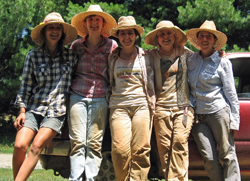Eco-villages are in Harmony with the Values of the New Great Age

By Sandra Weaver
Eco-villages are the future. As people lose jobs and become disgruntled with the high cost of living, the desire to live in harmony with nature and exist in a more naturally social community will flourish.
Life is changing quickly as the economy, the financial markets, and the governments go through major debacles. If you think the government is going to save you, think again. The government is having a hard time saving itself.
Eco-villages may be the best alternative for many to not only survive, but thrive with the monumental global changes we’re all experiencing.
Eco-villages are the oldest form of organized community. Our ancient ancestors lived in harmony with nature and with each other in a shared environment. Everyone worked together to benefit the greater whole. No matter how old or young or disabled, each person had worth and a job that matched their abilities in the greater community.
Something magical happens when you break bread with another. They become human and are appreciated in ways many of us have never experienced. You see the similarities instead of the difference, and tend to work harder on yourself and your relationships to experience harmony within the group.
What is an eco-village or intentional community?
Eco-villages are communities formed with a common goal of becoming "socially, economically and environmentally sustainable." These intentional, formed communities take into account their impact in these three key areas. In many cases, if one of these areas is impacted in a negative way, then the concept or idea does not go forward.
This isn't new. Ancient people existed this way. Living in harmony with nature was paramount for Native Americans. The earth was their mother. They cherished her and knew their very existence depended on treating the earth with respect and love. Many tribes projected four or more generations into the future before making any decisions. If a negative impact was foreseen ahead, the plan was dropped.
Robert and Diane Gilman founders of Eco-Villages and Sustainable Communities, a popular newsletter, have this to say about eco-villages: "A human-scale, full-featured settlement in which human activities are harmlessly integrated into the natural world in a way that is supportive of healthy human development, with multiple centers of initiative, and (which) can successfully be continued in the indefinite future."
The people who form these communities chose to live with or near enough to each other to carry out their shared lifestyle or similar purpose together. These communities can be co-housing communities in a big city...students living together near universities...or homesteaders working together towards a completely sustainable lifestyle in a rural or remote area.
The Mennonite and Amish communities today are an example of sustainable usually ecologically correct communities.
Shared core values and a willingness to work together to achieve their community vision is the main reason people form eco-villages. Most of these communities have a vision of a better lifestyle then what they had in the past. Something is usually lacking with the lives they used to live. Often it's certain important spiritual, moral or environmental values they feel can best be experienced as a unit in a more controlled environment.
Most eco-villages have 50 to 300 members depending on the size of the track of land and the impact of the population size on their property. But, they can be of any size. A common rule is the population size cannot impact the environment through overuse or abuse. In these cases, part of the population would have to break off and form another community in a different location...just like our ancestor did thousands of years ago.
The major benefits of ecovillages:
- Close social bonds are formed within the member group.
- Group cultural, spiritual, and moral values are shared and taught to children often in a controlled environment.
- Centralized sustainable electricity, water, gardening and sewage or gray water systems would be put into place to serve the community usually in an ecologically friendly way.
- Many eco-villages control the types of foods grown, as well as the processing and storage of these foods.
- Green building practices taking advantage of the climate, and terrain are usually adopted to promote the vision of living in harmony with nature.
- Large tracks of their territory is usually kept or returned to its natural state to contribute to the community’s well-being, and to create a harmonious relationship with the natural environment.
- Centralized jobs within the community could support much of the community and provide the necessary skills and services needed to benefit the greater whole.
- Loneliness so prevalent in cities would not be a major issue, because of the shared duties and activities associated with eco-villages.
- Costs and facilities are shared within the community resulting in lower monthly expenditures.
How permaculture figures into the development of eco-villages.
Permaculture? is a series of steps and principles designed to create sustainable human settlements that are in harmony with nature. It takes into consideration everything around the community...the plants, animals, buildings and the people that live within the ecovillage.
It’s not just the fact that they exist together it’s how they all relate to each other in harmony. How do the goals of the community lend themselves to the natural clearings, woodlots, streams or other waterways, hills, rock formations, etc? These are questions that should be asked before any changes are made to the natural landscape.
Feng Shui plays an important part is developing a harmonious eco-village. It’s all about listening to the land, feeling it, seeing how the natural landscape features, complement your eco-village objectives, rather than changing the landscape to suit your vision.
The goal of an eco-village should be to "enhance" the natural landscape with their presence. This requires that the members of the eco-village get to know their land first before they develop a site plan. A rigid site plan before the land is purchased does not support permaculture or serve the best interests of the community.
When the property is purchased and the community members have had a chance to live with the landscape, then it’s time to plan their community in a sustainable eco-friendly way. Always keep in mind what you are...a community. Spreading yourselves far apart does not support that concept. Instead consider the needs for privacy while you nurture the concept of community.
Why are eco-villages necessary with the emerging planetary changes happening even since 2012?
Inner spiritual work is necessary to make the transition to our changing world. It’s time to take on the values of the new Great Cycle of love, brotherhood, unity and integrity. It’s through forgiveness and reconciliation that your safety lies.
Our ancient ancestors knew thousands of years ago that we would be going through this monumental change and cultures like the Classic Maya, the Greeks along with the Egyptians, and the Eastern Indians wrote about what we could expect. So far, they’re accuracy is astounding and noteworthy.
An eco-village based on the values of "love, brotherhood, unity and integrity," are in line with the values these ancient people predicted for around 2012 and beyond. The Maya were so excited they wrote about these changes over 2000 years ago on their buildings and stela.
I don’t know about you, but these values resonate with me as being good values to take on no matter what happens. If an eco-village is formed with these values, I feel they will have a much greater chance of success. Massive changes are inherent with all Great Cycle changes, which even science agrees occur.
Where to look for more information on ecovillages.
The number of eco-villages forming right now is astounding. If you would like to consider forming an ecovillage or joining one with like-minded people, consider contacting organizations who have done just that successfully. Like any business, starting an eco-village is challenging. Following the organizational guidelines of thriving communities, will greatly increase your chances of success.
Here are some resources you may want to consider:
Fellowship for Intentional Community – www.ic.org
Cohousing Network – www.cohousing.org
Ecovillage Network of the Americas – www.ena.ecovillage.org
North West Intentional Communities Association – www.ic.org/NICAM
Conclusion:
Eco-villages know our mainstream lifestyles are not practical or sustainable in this changing world.
From an economic point of view many can no longer afford the "luxury" of living in the independent single family lifestyle.
Socially, in our hearts, we know the isolation experienced by the individual household often is not working and doesn’t nurture our souls.
Environmentally, the earth is crying from the devastation we have brought to her, and deep inside we all know that our very existence depends on our Mother. The children of today are saddled with allergies, chemical sensitivities, social issues. These children, the indigo, crystal and rainbow children are here to show us what doesn’t work in our lives anymore through these environmental sensitivities.
Eco-villages are a way to nurture and fulfill these three aspects and to integrate the values of the next Great Cycle, the Age of Aquarius or ascending Kali Yuga. It’s all the same. It’s when we’re in alignment with these values that we feel peace, love and harmony. Eco-villages move us towards these values in a positive way.
Resources:
Creating a Life Together, Diane Leafe Christian
Ecovillages, A Practical Guide to Sustainable Communities, Jan Martin Bang
Ecovillages Newsletter Founded by Robert and Diane Gilman
Use this link to return to the Home Page
Copyright (c) 2008-2014. Sandra (Musser) Weaver, www.2012-spiritual-growth-prophecies.com - All rights reserved


New! Comments
Have your say about what you just read! Leave me a comment in the box below.